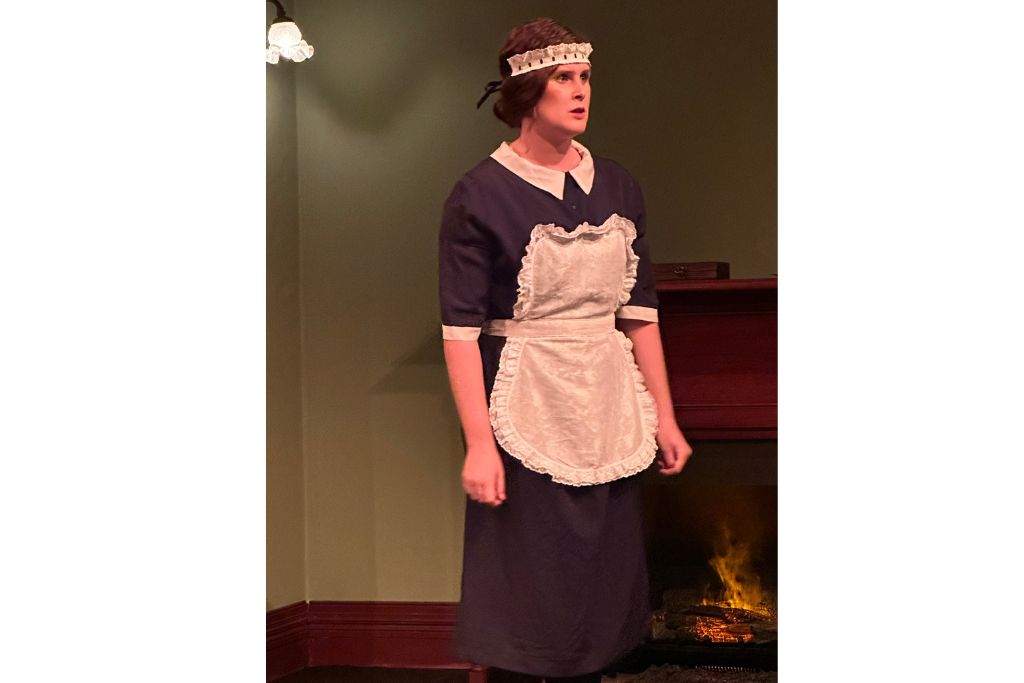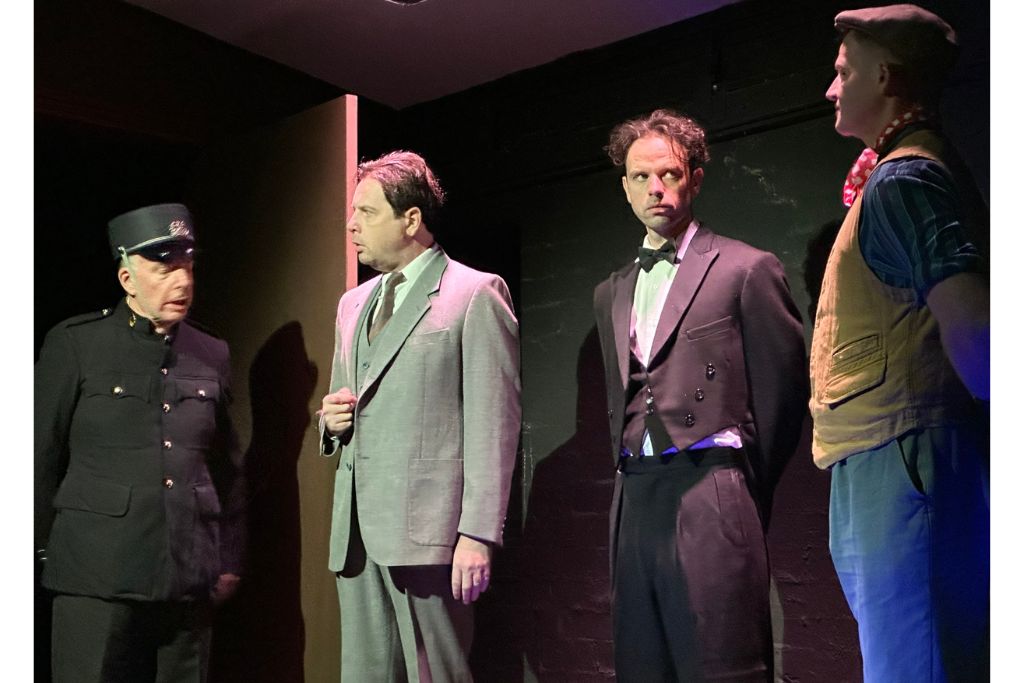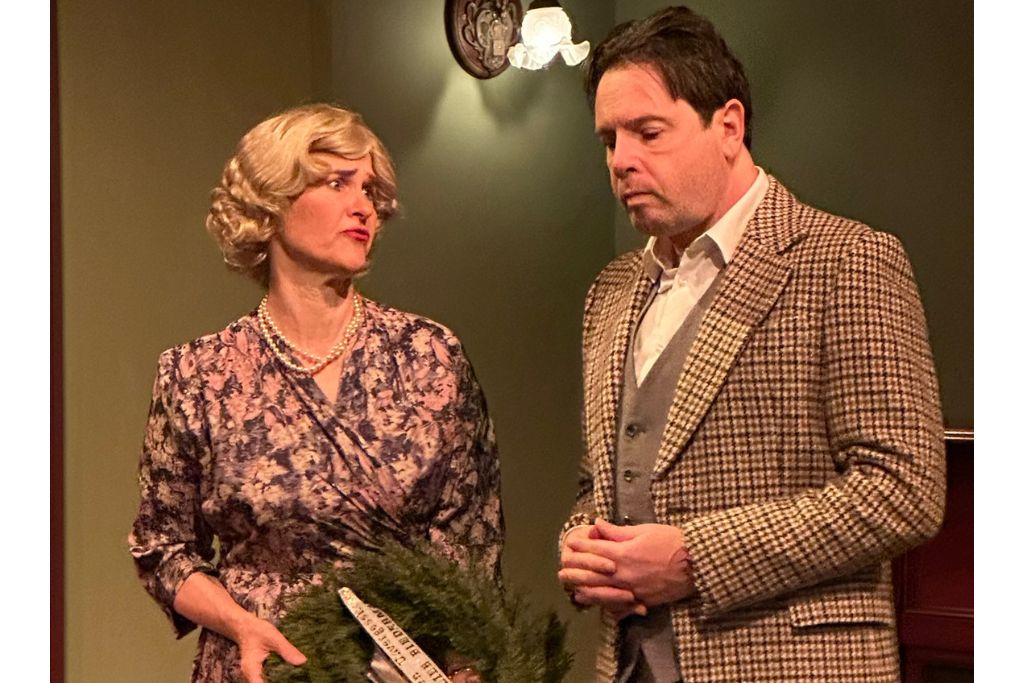The Fire Raisers is a play by Swiss novelist playright Max Frisch. Written in German in 1953, Herr Biedermann und die Brandstifte was initially a radio play before being adapted for television and the stage in 1958 as a play with six scenes. Two years later an epilogue was added. An English translation debuted in London in 1961, with various productions following in America through the 1960s. English language productions titled the play either The Firebugs or The Fire Raisers.
A new English translation by Alistair Beaton was produced in 2007 under the title of The Arsonists (starring Benedict Cumberbatch). It is this new translation that the 1812 Theatre Company brings to their Bakery Theatre, but titled The Fire Raisers. Interestingly, the original German title gives a little more insight into the themes of this absurd play – Biedermann effectively translates to “good man”. If that wasn’t enough, the central character is Gottlieb Biedermann. Gottlieb is not an uncommon man’s name in Germany and translates literally to God’s love, or loved by God, and more generally to “goodness”. So our protagonist, Gottlieb Biedermann is “loved by God – good man”. Or is he?
The play itself, although written in German in 1953, does not specify exactly where or when the story is set, but Director Andrew Ferguson has chosen to set this production in a German town during the 1930s. The set and costumes effectively establish this time period, although with no actual reference to any war going on, it can be assumed the story is prior to the onset of WWII. The timing of the story does make a significant difference, and with current world events, the parallels to today are certainly clear. Wisely, there are no pretend German accents, but instead some phrases and lines are delivered in German. However, the audience is immediately introduced to a Heir Biedermann as a seemingly respectable middle-class business man,.
In the role of Herr Gottlieb Biedermann is Brett Hyland, a well established actor in the Melbourne community theatre scene and certainly a familiar face for regular 1812 Theatre patrons. Our initial introduction to Biedermann is that he seems to live up to his namesake of being a good man – willing to help out a stranger in need of some food and shelter, keen to protect his wife with her heart condition, and successful in his business. Hyland plays the good guy well, and initially the audience is easily convinced that Herr Biedermann is being generous.
As the play continues, we learn more about Herr Biedermann, and Hyland cleverly unpacks the complexity of this character, taking the audience on a roller-coaster of associated emotions. Initially Herr Biedermann appears frustratingly gullible and naive, afraid to offend, but as the story progresses, he faces the audience and admits he has always known the truth – and in that moment our almost likeable protagonist becomes very unlikeable. We see a self-absorbed man who is only concerned about his own needs. Does it matter if someone else’s house burns down as long as yours is still okay?
Pia Maganov makes her 1812 Theatre debut as Gottlieb’s wife, Babette. Maganov brings a sense of frailty and fear to her character that perfectly balances the arrogant bravado of Hyland’s Gottlieb.
Freya Timmer-Arends is convincing as the Biedermann’s maid, Anna. A little feisty, but will follow orders, even if she doesn’t always agree with them.
Sitting on stage for much of the play is the Leader of the Fire Brigade, played by Felix Green, quietly smoking a pipe and watching on as the events unfold. Green delivers quite a number of his lines in German, which he then immediately translates, and brings a commanding and foreboding presence to the stage.

Liam Mitchinson is delightful as Joseph Schmitz, portraying a rather likeable, albeit mischievous, character that makes Gottlieb’s acceptance of this stranger in his home all the more believable. In contrast, Ryan Brennan’s portrayal of Willi Eisenring immediately raises suspicions in the minds of the audience.
Director Andrew Ferguson joins the cast convincingly as both a policeman and Professor of Philosophy, with Nyah Barnes taking a moment from her role as stage manager to sit onstage in a silent role.
The casting calls for a chorus of fire brigade members who act like a Greek chorus to this unfolding tragedy. Rather than appearing to the side of the stage, this “Greek chorus” instead appears as a projection at the back of the stage. The chorus members deliver their lines in German, with English subtitles beneath, but there were moments when the subtitles flashed so quickly it was difficult to keep up. The chorus were not dressed in the same authentic-looking fire brigade uniform that was presented onstage and their presence was at times confusing. They appeared more modern that the cast on stage, with an almost cartoon-like fire brigade logo. While I liked the decision for these chorus members to deliver their lines in German, having them on a screen and not on stage was quite jarring and distracting from the story.
The impressive set (design by Andrew Ferguson and Dale Johnson) was extremely well done, with a almost hypnotic and realistic fire burning constantly (and quite prophetically) in the fireplace at the back of the set, serving as a constant reminder of the lurking risk in this town. An exceptional lighting design by Robin Le Blond created not only a suitable home and attic interior but also brilliantly created the illusion of the place being engulfed by fire. This was enhanced by an excellent sound design by Blake Stringer and Robin Le Blond. Costumes by Chris Bartle and Tallulah Morrison established the era.

The Fire Raisers is presented as a one act play with an approximate running time of 90 minutes. At the conclusion of The Fire Raisers, audience members are invited to join the cast for drinks in the foyer – which is a regular occurrence for all 1812 shows. However, after a short time of conversation, audience members are invited back into the Bakery to watch the rarely performed Epilogue or “Nachspiel” as a rehearsed play-reading. While this adds an extra 30 minutes to the performance, it’s well worthy staying to watch. Scripts in hand, the cast are now out of costume, but not out of character. The Nachspiel not only confirms the outcome of our characters, it adds some further complexity to the already absurd play. Perhaps it was the presentation of this Epilogue as a rehearsed play-reading and the somewhat relaxed nature, or perhaps it was the squawking parrot in the background, but at times it felt rather Monty Pythonesque.
Gottlieb is now in hell, questioning his place in eternity – outright lying about any knowledge of the intention of the arsonists he was harbouring in his attic. I couldn’t help but recall a statement in a concentration camp in Germany that said anyone in the local town who said they didn’t know what was really going on was lying.
There’s much to unpack in The Fire Raisers. There are some very clear antisemitic references in the play, set in the era as Hitler rose to power – something that didn’t happen overnight, but was a gradual slow building of power, as “good” people did nothing.
If you enjoy theatre that provokes deep thought and reflection of current world events, and is just a tad absurd, it’s worth checking out The Fire Raisers. And definitely hang around for the Nachspiel.

The Fire Raisers is now playing at the 1812 Theatre in Upper Ferntree Gully





